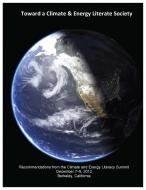
A new report issued by the National Center for Science Education, "Toward a Climate & Energy Literate Society" (PDF) offers recommendations for improving climate and energy literacy in the United States over the course of the next decade. As NCSE's Mark McCaffrey remarked in a March 4, 2013, press release announcing the report, "We have lots of information about climate change, but much of it is falling on deaf ears"; "Toward a Climate & Energy Literate Society" is intended to provide a way forward. As the executive summary explains:
Understanding the causes of and responding to climate change is the major challenge of the 21st century. Most Americans do not understand the basics of climate change and energy or how they are inextricably connected, yet informed decisions, a prepared workforce, and risk reductions are not possible without a clear understanding of these topics. Research shows that in general those who have a basic understanding of the science are more concerned with addressing climate change (Leiserowitz 2010, 2011, Miller 2012). Moreover, improving society's climate and energy literacy should be a top priority addressed through science education and through a range of other education, communication, and outreach strategies.
To counter the scientific illiteracy standing in the way of meeting these urgent 21st-century challenges, a group of fifty leaders in the climate and energy community gathered in Berkeley, California, between December 7 and 9, 2012, to participate in the Climate and Energy Literacy Summit hosted by the National Center for Science Education. The attendees included climate, energy, education, technology, and research experts, curriculum developers, philanthropists, science journalists, representatives from climate- and energy-related non-profits and professional societies, federal and state agencies, and the National Academy of Sciences.
The goal of the Summit was to identify ways "to substantially and measurably improve climate and energy literacy to provide society and the next generation with the scientific foundation to take informed actions to minimize climate impacts and prepare for changes that are already well underway."
Participants agreed that many components already exist to forge a national climate and energy literacy initiative, but substantial challenges remain in terms of coordination, training and funding. Following are key recommendations of the Summit:
- Create a national initiative using the Collective Impact approach for effective partnership by developing a common agenda, shared measures, engaging in reinforcing activities and continuous communication, and having a supporting infrastructure;
- Significantly expand through private funding the availability of existing high-quality climate and energy related education, communication, and outreach programs;
- Emphasize teaching climate change and energy topics throughout education, which is vital to establishing a strong foundation for future decisions and in fostering resilient communities;
- Build on existing resources and frameworks, including the U.S. Global Change Research Program's Climate Literacy and Energy Literacy documents (see Appendix II);
- Support the climate and energy-related aspects of the forthcoming Next Generation Science Standards (NGSS);
- Collaborate with key programs and partners, including the 100K in 10 initiative, which aims to recruit and prepare 100,000 science, technology, engineering, and mathematics teachers in ten years;
- Maximize the potential for digital learning opportunities, including online courses, educational gaming and the use of digital badges and certification;
- Identify and address the education, communications, and outreach needs of underserved and vulnerable communities relative to these topics;
- Conduct a national survey to determine whether, where, and how climate change and energy topics are taught in formal education; and
- Anticipate and effectively respond to denial and manufactured doubt about climate change.
"It's easier said than done," NCSE's Minda Berbeco commented in the press release. "The challenges are considerable in terms of coordination, training, and funding." But NCSE's executive director Eugenie C. Scott insisted that the task is vital: "With climate change the major challenge of the 21st century, it is imperative to ensure that the current generation of K-12 and college students are equipped with the best scientific information available to help them make the crucial decisions about climate and energy policy that they will have to make."
